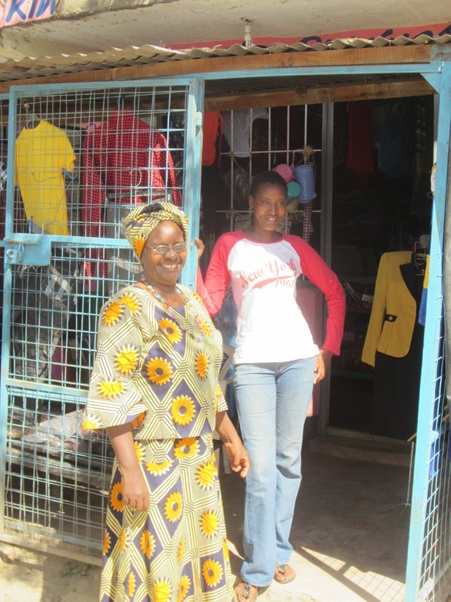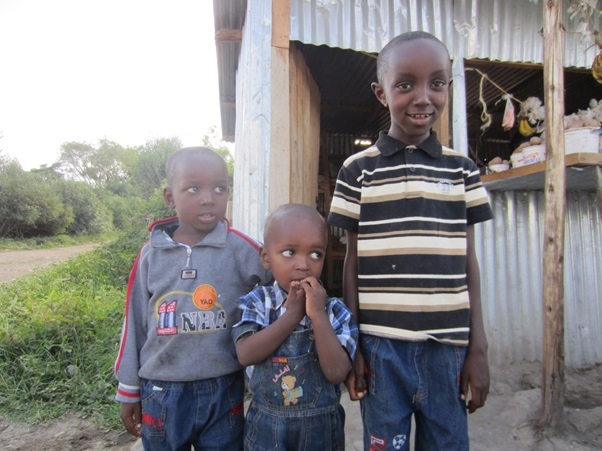The Social Economy in Higher Education project handbook will have a chapter on the importance of social capital to the social/solidarity economy. This article describes a women’s group in Kenya which is drawing on the bonds between a group of women to manage micro-finance in order to provide sustainable incomes to support their families and provide employment. This post is written by Mike Calvert, York St John University, UK, collaborator with the Social Economy in Higher Education project.
Readers of the blog may have read an earlier post (Dec ’13) in which I described the work of four women entrepreneurs in Nairobi. Recently, I had the good fortune to meet them again in Nairobi and visit two of the enterprises. It is clear that they are going from strength to strength. Having paid back all the money they were lent in June 2013 with interest by November, they decided to take out KES30,000 each and step up their investment. A further injection of capital enabled them to increase the size of their loans. They had requested a longer period to return the money (December – August) and this had been agreed.
In the earlier post, the women described the impact the micro-finance had had on their lives:
Susan Wangui
Susan needed the money to expand her boutique. She sells clothes and cosmetics. She started by selling goods from home. As her customer base increased she needed the capital to expand. She had identified an opportunity but her limited finance was a brake on expansion. She regarded the funding and the funder as a ‘tyre jack’ (piga jecki in Swahili). She had found it easier to pay back the money than she had anticipated. She now employs one person to run the shop which frees her up for other tasks.
She had increased in business confidence as a result. Her aim was to register modest profits. She concentrated on customer care and customers speak well of her business. The principal challenge was the balance of what to take as salary and what to re-invest. This was seen as a delicate balance.
Jacinta Waceke
Jacinta was a housewife before meeting Mary. She earned her living by going to people’s houses cleaning clothes – an arduous and poorly remunerated task. She had acquired a kiosk but there was no produce to sell. The capital had enabled her to establish a greengrocery business. The intention was to have the kiosk divided into three sections to host a ‘hotel’ meaning a canteen and a shop. She intends to employ someone else to work with her.
Alice Muthoni
Alice used the money to expand her egg business. The issue for Alice was cash flow as it takes four and a half months to rear the chickens until they produce eggs and the cost of food, upkeep and electricity means that there are considerable outgoings but no income until the eggs are laid. She described herself as ‘almost stuck’. The income will enable her to have continuity rearing another batch of chicks whilst the others are laying eggs. She is now selling 16 trays a day (thirty per tray) and making KES1000 profit per day. The market demand is high for eggs. She is also selling the manure from the chickens adding to her income.
Eunice Mama Magiri
Eunice had been in the tailoring trade since 1986. She moved to her current place and had increased responsibilities for school fees and the house. She had visited Susan to request money when she learned of the project and requested the loan of KES20,000. She was not new to the market but needed the funding when she received an order that she could not source for lack of funds. This enabled her to supply clothes to Eldoret. She now had many orders and was keen to get more funding to allow her to expand.
Update: what have they been up to?
All four women have benefitted from the investments they have made. Eunice Mama has been able to control her cash flow. She is able to source materials more confidently and gives work to her previous employees who carry out piece work. Susan has diversified from selling women’s clothes to selling men’s and children’s clothes, shoes and cosmetics. Her business is flourishing. Jacinta wanted to diversify in terms of what she could offer at her kiosk. As a result of the second injection of money she has been able to provide samosas, chapattis, chips and tea and, most importantly, she is employing her husband full-time. Previously, he was doing odd job work digging gardens, etc. She is now talking about buying a cow which is an ambitious aim but with a cow yielding 30 litres a day, she could sell a great deal of milk apart from putting it in the tea – Kenyans tend to put tea in their milk and sugar rather than the other way around as in the UK! Jacinta is much more confident and can now feed her children well. Alice, who is breeding chickens, has been able to buy a second brood of 600 chickens and when the current hens are no longer laying eggs, will have a new source of eggs. She is currently using a wholesaler to sell her eggs. She is also selling more chicken manure (14 bags up from 10).
What then are the next steps?
With a further injection of capital, the group can currently draw on at least KES50,000 from the new capital in addition to the money they are paying back as it becomes available. They have decided amongst themselves that they are going to save KES 1,000 (£7) per month in addition to making their monthly payment. This is an important shift in their thinking as they plan to save for the future. A further investor is possible.
They have decided also to open an M-pesa account. M-pesa is a way of transferring money electronically via the mobile phone. This is highly developed in Kenya and can even be used by Kenyans without a bank account. This will mean that they can make payments or receive new monies via the phone rather than face-to-face.
Finally, they also talked about allowing the money to be used like an overdraft facility for those who needed cash in the short term and would pay it all off in a month (at 5% interest). It is interesting to note that they have gone from first time investors to behaving like social bankers. They are certainly sharpening their business acumen.
Entrepreneurial caution
A crucial decision is the extent to which they open the scheme up to others. They have now decided to offer a loan to another member of their core group (of 11 women) and to mentor that individual. This pilot will help them to understand the challenges of opening this up to a wider audience. There was reference in a previous blog to the issue of how much to draw as income and how much to invest. Their issue now is whether they should open a bank account and what interest their money would attract compared with what they can gain in terms of their own value-added work. They have decided to open an account that needs several signatories for withdrawal but they would rather re-invest money rather than see it sitting in a bank.
The group collectively want to move slowly but also have tasted the transformational impact of the investments to date and may be impatient. Our discussion touched on risk management and the need to ensure that they did not overreach themselves.
All four women and their mentor are showing that with a relatively modest level of help and close support and encouragement, they can produce impressive changes in their lives and businesses. It is early days but there are grounds for optimism and it is hoped that this model, however small, can benefit others.
Our next meeting will be in June 2014 when we will be able to visit the businesses and see for ourselves what is happening on the ground. Watch this space!

